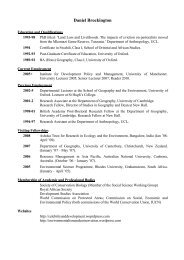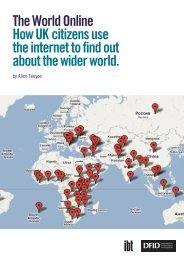World
Viewing the world - Full report
Viewing the world - Full report
- No tags were found...
Create successful ePaper yourself
Turn your PDF publications into a flip-book with our unique Google optimized e-Paper software.
J. Appendix: Other research in this areaResearch documents and reports relating to this studyinclude:TV and the Third <strong>World</strong>: A British View, J.M. Wober,October 1987, ITCResearch commissioned by the IBA (shortly to becomethe ITC) into people’s perceptions of the Third <strong>World</strong>and their interest in television programmes on thesecountries. The highest interest was found to be shown inprogrammes on countries that appeared to affect the UKin some way. Countries seen on television most oftenwere considered to affect the UK most, and thereforewere the most interesting. The research concluded thattelevision’s influence is linked to viewers’ interests, it isnot an unsought influence. There is an opportunity fortelevision to both satisfy existing interest and stimulatenew interest.British Broadcasters and the Third <strong>World</strong>: A PreliminaryStudy, J.M. Wober, November 1988, ITCInterviewed 330 people working in regional televisionand local radio newsrooms across the UK. Over halfthought there was too little programming currentlylinking Third <strong>World</strong> issues to local and regionalaudiences. Broadcasters were generally more optimisticand radical than the public at large.BBC News: The Future. Public Service News in the DigitalAge, 1998, BBCA brief summary of the findings of the BBC’s major NewsReview, conducted 1996-1998 and including surveys of2000 adults, focus groups, detailed audience research,research by the Henley Centre into social change and ananalysis of competitors’ performance. The researchshowed that the audience wants to know about eventsand issues in other countries, and positively wantscomplex subjects and unfamiliar stories from abroad tobe reported. This summary also presents the prioritiesand aims of BBC News as a result of the Review’sfindings. Part of the renewed commitment to stronginternational coverage is the repositioning of the Nineo’clock News as a showcase for foreign news coverage.The Young, October 1998, BBCAn internal BBC report analysing the tastes andaspirations of the 16-34 age group in Britain, whichconstitutes 16.7 million people and is identified as acrucial section of the potential BBC audience. While thisreport contains little of direct relevance to coverage ofthe developing world, it does include the fact that in1995, environment and world issues are among the topsix concerns of this group, after Work, Money,Family/relationships, Travel and Health. However, this islower down the list than it was in 1985 when if camefourth, after Family/relationships, Work and Travel.[Source: Life Trends, 20/20 Vision Survey]News Production at WTN: An Analysis of Television NewsAgency Coverage of Developing Countries, Dr. Chris Paterson,1996 (doctoral thesis)Paterson, currently at the University of Leicester,combines a political-economic analysis of theinternational television news system and ethnographicanalysis of television agency news production to explaindistorted and infrequent coverage of the developingworld.Despatches from Disaster Zones: The Reporting ofHumanitarian Emergencies, edited by Don Redding, 1998,Save The Children UK.Reports from the conference of that name, held on 27thMay 1998, with contributions from George Alagiah, JaneStandley, NGOs and others on the news reporting ofRwanda, Zaire, Sudan and Somalia.The Bigger Picture: A Survey of the Audio-Visual Landscape1997-2000, Robert Lamb, 1997, UNICEF.An overview of global broadcasting, with recommendationsto UNICEF and development agencies on theirapproach to the media. The report underlines thattelevision remains the world’s most influential medium,and that many dominant trends apply world-wide. Forinstance, the pattern of primetime viewing is similarthroughout the world with its emphasis onentertainment, sports and news; public servicebroadcasting is “on the wane throughout the world”; andaudiences are drawn to home-grown programming.<strong>World</strong> out of Focus: British Terrestrial Television and GlobalAffairs, Samantha Lay and Carolyn Payne, 1998, 3WE.The fourth in a regular series of reports monitoring thequantity of British terrestrial television output oninternational issues. This report found that, despite ahalt in the downward trend in international factualoutput, this output remains at a substantially lower levelacross the channels than at the very beginning of the1990s.Bringing the <strong>World</strong> Home: A Newsroom Handbook, 1999,American Society of Newspaper Editors Suggestions for(print) news editors on how to make international newscoverage more engaging and extensive, in collaborationwith The Freedom Forum. Although aimed at newspaperDFID – July 2000 177





